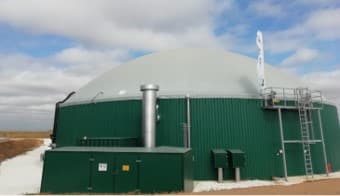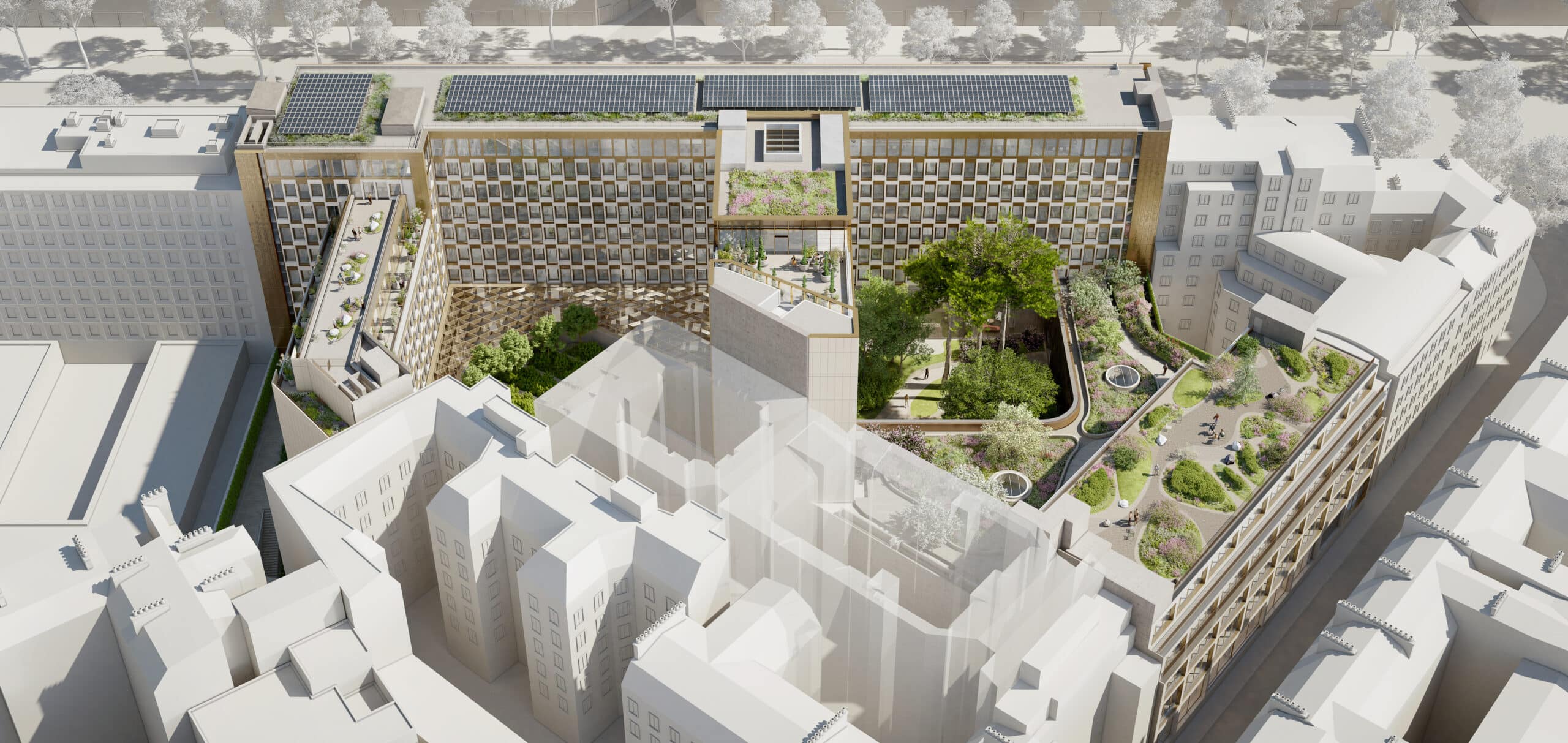
Purchase of environmentally verified biogas
As part of a low-carbon trajectory contributing to collective carbon neutrality, Gecina has been integrating biogas into the gas supply of its buildings since 2019 …

Reducing the building's carbon footprint during the development phase and then in the operating phase in order to make it part of the CAN0P-2030 trajectory, Gecina's plan to accelerate the decarbonisation of buildings in operation by 2030.
Located in the heart of the 17th arrondissement, this project consists of the major renovation of a heterogeneous building complex: a Haussmann-style section facing rue Pierre Demours, a second section facing rue de Courcelles built in the 1960s and the creation of an additional 3,000 sq.m. of floor space. This renovation represents 30,000 m² of offices, coworking spaces, cafeteria, shops, business centre and restaurant. This mix of uses will be enhanced by the creation of terraces and planted areas, thus offering occupants a landscaped living environment that is rare in the heart of Paris.
The project is committed to an ambitious environmental approach. Gecina attaches particular importance to limiting the environmental impact of the restructuring and to improving the building’s performance once it is in operation.
The Mondo restructuring implements a representative set of elements of Gecina’s CSR policy, particularly in terms of low carbon and circular economy:
▪ A project designed to consume 66 kWh/m² of final energy and emit 3.4 KgCO2/m2 once in operation, i.e. respectively 2.5 times less and 4 times less than a comparable building on the market according to the Observatoire de l’Immobilier Durable;
▪ 60% reduction in energy performance and 75% reduction in carbon performance after renovation;
▪ Emissions due to the renovation and the construction materials used very much under control: only about 709 kgCO2/m²/year thanks to the preservation of the existing and the selection of materials that have carried out an LCA. This is a better result than the level of the most demanding label on the market (735 KgCO2/m2 of the BBCA label – Bâtiment Bas Carbone) and the average of comparable operations (1109 KgCO2/m2 according to the E+C- Observatory)
▪ Implementation of renewable energy on the site: installation of 315 m² of solar panels on the roof and connection to the urban heating and cooling networks;
▪ Resource diagnosis carried out prior to the project to identify available material deposits and potential outlets;
▪ Inclusion in contracts of specific clauses for the selective removal of materials integrated from the cleaning phase;
▪ Reuse of 22 material flows in and ex situ, i.e. 260 tons of materials: floors, carpet, wall stones, glass partitions etc.;
▪ Seven associations benefited from material donations for responsible and solidarity-based projects (lighting, furniture, kitchen equipment, etc…);
▪ 251 tCO2 were thus avoided on this project thanks to reuse;
▪ Creation of 2,300 m² of vegetated and accessible surfaces;
▪ 770 m² of rooftop and agricultural greenhouse with an estimated local production of 4 tons of aromatic herbs, vegetables and ornamental flowers;
▪ Multiple services: a workshop and 4 bicycle rooms, 280 m² fitness centre, varied catering offer (ERP food hall, 2 cafes), concierge service, app to access the building’s services ;
▪ Proximity to public transport (metro lines 3 and 2, RER C, bus).
This policy enables the highest environmental standards to be achieved on this project:
▪ HQE Sustainable Building Excellent,
▪ LEED Gold,
▪ BBCA Renovation,
▪ WELL Gold,
▪ BiodiverCity®,
▪ WiredScore Platinum.
on which the project has a significant impact
Scope 1 : Improvement of the carbon performance of the building after renovation
Quantification : Emissions of 3.4 kgCO2/m²/year, i.e. 17.6 kgCO2/m2/year reduction compared to the performance of the building before works (reduction of 27,100 tCO2e over 50 years)
Scope 3 : Low-carbon restructuring through the circular economy approach: a carbon performance of 709 KgCO2/m²
Quantification : Emissions of 21,270 tCO2, i.e. a reduction of 12,300 tCO compared to the average performance of a comparable building in France
The building has a surface area of 30,000 m². The carbon footprint of the operation is estimated over the life of the building at 3.4 kgCO2/m²/year (compared to 21 kgCO2/m²/year before the works). This represents a reduction of 542 tCO2/year. The carbon footprint of the renovation is 709 kgCO2/m² (compared to 1109 kgCO2/m² for a comparable average performance in France). This represents a reduction of 12,300 tCO2.
Confidential
2018
153 rue Courcelles - Paris 17th
This project contributes to the following SDGs:
Circular economy actions are deployed on 100% of Gecina’s current developments. As a result, Gecina has reduced its carbon footprint of projects under development by 42% in five years, with an average performance of developments underway in 2021 of 771 KgCO2/m2.
By the end of 2021, Gecina’s office developments will target an average consumption of 63.5 kWh/m2/year once delivered and average emissions of 2.5 KgCO2/m2/year.
100% of Gecina’s developments produce renewable energy on site.
mathilderamos-guerrero@gecina.fr

As part of a low-carbon trajectory contributing to collective carbon neutrality, Gecina has been integrating biogas into the gas supply of its buildings since 2019 …

As part of a low-carbon trajectory contributing to collective carbon neutrality, Gecina has been integrating biogas into the gas supply of its buildings since 2019 …